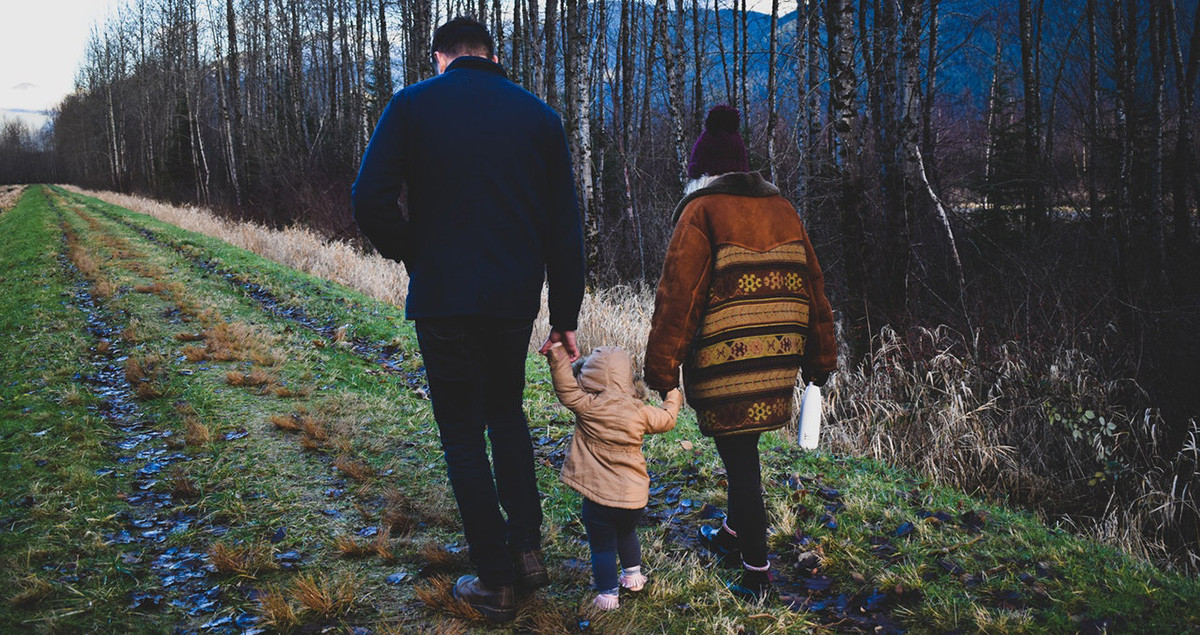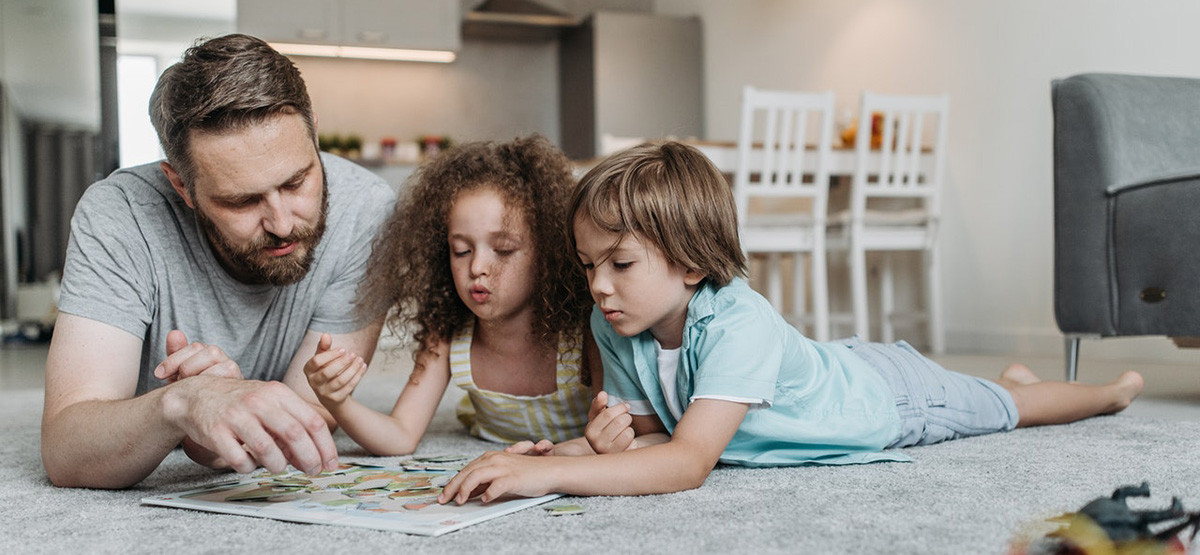More than 40 million Americans boast German ancestry, fostering a sense of connection to German culture, even without residing in a German-speaking nation. If you resonate with this sentiment and wish to articulate your German heritage, perhaps mentioning a great-great-grandparent from Germany, understanding family terms in German is a great starting point.
Learning family vocabulary in German is not only practical but also an excellent entry point into the language itself. These are often among the first words we grasp in our native tongue, renowned for their simplicity and ease of pronunciation. Just as German infants learn to say “Mom” and “Dad,” so can you!
Understanding “Familie” – The German Word for Family
The German equivalent for family is “Familie” [faˈmiËli̯ə], with the plural form being “Familien” [faˈmiËli̯ən]. Notice the comforting similarity to the English word “family,” pronounced somewhat like “Fah-me-lee-eh(/en).”
While slang terms like “deine Alten” (your old ones) exist for parents, it carries a negative undertone and is best reserved for informal jesting among close friends. In polite contexts, especially when:
- Meeting a German friend’s or partner’s family.
- Engaging in German small talk about family.
- Initially inquiring about someone’s family situation in German.
It’s advisable to adhere to the formal vocabulary we’ll explore below.
Exploring Your German Family Tree
 Free downloadable German family relationship chart.
Free downloadable German family relationship chart.
Immediate Family: The “Kernfamilie” in German
In German, the nuclear or core family is known as the “Kernfamilie“. Mastering the vocabulary to describe your immediate family is fundamental for basic German conversations. Let’s delve into essential terms like “Mother,” “Father,” “Brother,” “Sister,” “Daughter,” and “Son” in German.
 A young boy enjoys a walk in the German forest with his parents and sister, showcasing family time in Germany.
A young boy enjoys a walk in the German forest with his parents and sister, showcasing family time in Germany.
| English | German | IPA |
|---|---|---|
| Mother | Mutter | [ˈmÊŠtÉ] |
| Mom | Mama | [ˈmama] |
| Mommy | Mami | [ˈmami] |
| Father | Vater | [ˈfaËtÉ] |
| Dad | Papa | [ˈpapa] |
| Pop | Papi, Paps | [ˈpapi, paps] |
| Parents | Eltern | [ˈɛltÉn] |
| Siblings | Geschwister | [ɡəˈʃvɪstÉ] |
| Brother | Bruder | [ˈbÊuËdÉ] |
| Sister | Schwester | [ˈʃvÉ›stÉ] |
| Son | Sohn | [zoËn] |
| Daughter | Tochter | [ˈtÉ”xtÉ] |
| Wife | (Ehe-)frau | [ˈeËÉ̯ˌfÊaʊ̯] |
| Husband | (Ehe-)mann | [ˈeËÉ̯ˌman] |
Expanding the Circle: Extended Family in German
Families often extend beyond the nuclear unit. You might find yourself wanting to discuss your cousins, grandparents, or even great-grandparents in German. Let’s broaden our vocabulary to encompass the extended family.
 A German grandfather enjoys a video call with his granddaughter, connecting with family online.
A German grandfather enjoys a video call with his granddaughter, connecting with family online.
| English | German | IPA |
|---|---|---|
| Grandmother | Großmutter | [ˈɡÊoËsËŒmÊŠtÉ] |
| Grandma | Oma | [ˈoËma] |
| Grandfather | Großvater | [ˈɡÊoËsËŒfaËtÉ] |
| Grandpa | Opa | [ˈoËpa] |
| Grandparents | Großeltern | [ˈɡÊoËsˌʔɛltÉn] |
| Female cousin | Cousine | [kuˈziËnÉ™] |
| Male cousin | Cousin | [kuˈzɛ̃Ë] |
| Aunt | Tante | [ˈtantə] |
| Uncle | Onkel | [ˈɔŋkl̩] |
| Niece | Nichte | [ˈnɪçtə] |
| Nephew | Neffe | [ˈnɛfə] |
| Great-grandparents | Ur-Großeltern | [uËÉ̯ˈɡÊoËsˌʔɛltÉn] |
| Great-grandmother | Ur-Großmutter | [uËÉ̯ˈɡÊoËs ˈmÊŠtÉ] |
| Great-grandfather | Ur-Großvater | [uËÉ̯ˈɡÊoËsËŒ ˈfaËtÉ] |
| Great-Aunt | Urgroßtante | [uËÉ̯ˈɡÊoËsËŒ ˈtantÉ™] |
| Great-Uncle | Urgroßonkel | [uËÉ̯ˈɡÊoËsËŒ ˈɔŋklÌ©] |
| Great-great-grandmother | Ururgroßmutter | [ˈuËÉ̯ʔuËÉ̯ʔuËÉ̯ɡÊoËsˈmÊŠtÉ] |
| Great-great-grandfather | Ururgroßvater | [ˈuËÉ̯ʔuËÉ̯ʔuËÉ̯ɡÊoËsËŒfaËtÉ] |
Family Through Marriage: Step and In-law Relations in German
Similar to many cultures, German perspectives on in-laws can be humorously complex. While positive relationships are common, the German language even has an idiom reflecting a less favorable stereotype: “Jemanden stiefmütterlich behandeln” (to treat someone stepmotherly), which translates to “to neglect or ignore someone.” Let’s explore the vocabulary for step and in-law family members.
| English | German Singular | IPA |
|---|---|---|
| Stepmom | Stiefmutter | [ˈʃtiËfËŒmÊŠtÉ] |
| Stepdad | Stiefvater | [ˈʃtiËfËŒfaËtÉ] |
| Step-sister | Stiefschwester | [ˈʃtiËfˌʃvÉ›stÉ] |
| Step-brother | Stiefbruder | [ˈʃtiËfËŒbÊuËdÉ] |
| Parents-in-law | Schwiegereltern | [ˈʃviËÉ¡ÉˌʔɛltÉn] |
| Mother-in-law | Schwiegermutter | [ˈʃviËÉ¡ÉËŒmÊŠtÉ] |
| Father-in-law | Schwiegervater | [ˈʃviËÉ¡ÉËŒfaËtÉ] |
| Daughter-in-law | Schwiegertochter | [ˈʃviËÉ¡ÉËŒtÉ”xtÉ] |
| Son-in-law | Schwiegersohn | [ˈʃviËÉ¡ÉËŒzoËn] |
Beyond Blood Relations: Other Family-Related Terms in German
Family encompasses more than just biological ties. To fully express the nuances of modern family structures, including chosen family, adoption, and marriage, here are some additional important German terms.
 A father enjoys reading a book to his children, a son and daughter, highlighting family moments in German culture.
A father enjoys reading a book to his children, a son and daughter, highlighting family moments in German culture.
| English | German | IPA |
|---|---|---|
| Adopted | Adoptiert | [adÉ”pˈtiËÉ̯t] |
| Surrogate | Leihmutter | [ˈlaɪ̯mÊŠtÉ] |
| Twins | Zwillinge | [ˈt͡svɪlɪŋə] |
| Triplets | Drillinge | [ˈdÊɪlɪŋə] |
| Quadruplets | Vierlinge | [ˈfiËÉlɪŋə] |
| Male spouse | Gatte | [ˈɡatə] |
| Female spouse | Gattin | [ˈɡatɪn] |
| Male partner | Partner | [ˈpaÊtnÉ] |
| Female partner | Partnerin | [ˈpaÊtnÉ™Êɪn] |
| De facto partner | Lebenspartner | [ˈleËbnÌ©sËŒpaÊtnÉ] |
| In love | Verliebt | [fÉ›É̯ˈliËpt] |
| Engaged | Verlobt | [fÉ›É̯ˈloËpt] |
| Married | Verheiratet | [fÉ›É̯ˈhaɪ̯ÊaËtÉ™t] |
| Separated | Getrennt | [ɡəˈtÊÉ›nt] |
| Divorced | Geschieden | [ɡəˈʃiËdnÌ©] |
| Widow | Witwe | [ˈvɪtvə] |
| Foster mom | Pflegemutter | [ˈpÍ¡fleËɡəˌmÊŠtÉ] |
| Foster dad | Pflegevater | [ˈpÍ¡fleËɡəˌfaËtÉ] |
| Foster child | Pflegekind | [ˈpÍ¡fleËɡəˌkɪnt] |
| Godmother | Patentante | [ˈpaËtnÌ©ËŒtantÉ™] |
| Godfather | Patenonkel | [ˈpaËtn̩ˌʔɔŋklÌ©] |
| Godson | Patensohn | [ˈpaËtnÌ©ËŒkɪnt] |
| Goddaughter | Patentochter | [ˈpaËtn̩ˈtÉ”xtÉ] |
| Baby | Baby | [ˈbeËbi] |
| Toddler | Kleinkind | [ˈklaɪ̯nˌkɪnt] |
| Tween | Tween | [ˈtwiËn] |
| Teenager | Teenager | [ˈtiËnʔɛɪ̯dÍ¡Ê’É] |
| Youth | Jugendlicher / Jugendliche | [ˈjuËÉ¡É™ntlÉªÃ§É / ˈjuËÉ¡nÌ©tlɪçə] |
| Adult | Erwachsener / Erwachsene | [É›É̯ˈvaksÉ™nÉ / É›É̯ˈvaksÉ™nÉ™] |
| Relative | Verwandter / Verwandte | [fÉ›É̯ˈvantÉ / fÉ›É̯ˈvantÉ™] |
| Ancestors | Vorfahren | [ˈfoËÉ̯ˌfaËÊÉ™n] |
| Generation | Generation | [É¡enÉ™ÊaˈtÍ¡si̯oËn] |
| Youngest child | Jüngstes Kind | [ˈjÊÅ‹stÉ™s kɪnt] |
| Middle child | Mittelkind | [ˈmɪtl̩kɪnt] |
| Eldest child | Ältestes Kind | [ˈɛltəstəs kɪnt] |
| Nuclear family | Kernfamilie | [ˈkÉ›ÊnfaËŒmiËli̯ə] |
| Small family | Kleinfamilie | [ˈklaɪ̯nfaËŒmiËli̯ə] |
| Blended family | Patchwork-Familie | [ˈpÉ›t͡ʃvÅ“ÊkfaËŒmiËli̯ə] |
Talking About Your Family in Everyday German Conversations
When initiating conversations with new acquaintances, inquiring about family naturally follows introductions. Asking about siblings or children is a common way to build rapport and share personal details. Let’s explore some basic conversational phrases about Family In German.
 Colleagues in a German office introduce themselves and chat about their families, building workplace relationships.
Colleagues in a German office introduce themselves and chat about their families, building workplace relationships.
Common German Family Conversation Starters
-
Question: Hast du Geschwister? (Do you have siblings?)
-
Answer: Ja, ich habe einen großen Bruder und zwei kleine Schwestern. (Yes, I have a big brother and two little sisters.)
-
Question: Hast du eine große Familie? (Do you have a big family?)
-
Answer: Meine Familie besteht aus meinem Papa, meiner Stiefmama, meinem Bruder Bruno und meiner Katze Fräulein Miez. (My family consists of my dad, my stepmom, my brother Bruno, and my cat Fräulein Miez).
-
Question: Leben deine Eltern in der Nähe? (Do your parents live close by?)
-
Answer: Nein, meine Eltern leben beide in Hamburg und ich lebe in Frankfurt. (No, my parents both live in Hamburg and I live in Frankfurt.)
Discussing Age in Family Context
A natural follow-up in family conversations is discussing ages, whether of siblings or even pets, as pets are undoubtedly considered family members.
-
Question: Ist deine Schwester älter oder jünger als du? (Is your sister older or younger than you?)
-
Answer: Meine Schwester ist zwei Jahre jünger als ich. (My sister is two years younger than me.)
-
Question: Wie alt sind deine Geschwister? (How old are your siblings?)
-
Answer: Mein kleiner Bruder ist erst 10. Er geht noch zur Schule. Mein anderer Bruder studiert. (My little brother is only 10. He is still in school. My other brother is in college).
-
Question: Wie alt sind deine Haustiere? (How old are your pets?)
-
Answer: Mein Welpe ist erst ein Jahr alt, und mein Papagei ist zwei. (My puppy is only one year old, and my parrot is two.)
Describing Family Traits in German
From physical resemblances to personality traits, there are many ways to describe your family in German, perfect for casual conversations.
-
Meine Mutter und mein Vater haben braune Augen, wie ich, aber meine Schwester hat blaue Augen. (My mother and father have brown eyes, like me, but my sister has blue eyes.)
-
Ich hab die schwarzen Locken von meinem Vater. Meine Mutter hat rote Haare. (I got my curly black hair from my dad. My mother has red hair.)
-
Ich bin mit einem Zwilling verheiratet. (I’m married to a twin.)
-
Ich bin adoptiert. (I’m adopted.)
-
Ich telefoniere einmal im Monat mit meinen Eltern. (I call my parents once a month.)
-
Ich bin ein Katzenmensch, aber mein Freund ist eher ein Hundemensch. (I’m a cat person but my boyfriend is more of a dog person.)
Humorous Insights: Family-Related German Idioms
German boasts a collection of amusing idioms and sayings related to family, adding a touch of cultural flavor to your language learning. For instance, “großziehen,” meaning “to raise someone,” literally translates to “to pull someone tall,” creating a whimsical image. Similarly, “Sorgerecht,” or custody, is literally “the right to worry,” and the big toe is playfully called “Großer Onkel,” the “Big uncle.”
| German | IPA | Literal Translation | Meaning |
|---|---|---|---|
| Großziehen | [ˈɡÊoËsËŒtÍ¡siËÉ™n] | To pull big | To raise |
| Sorgerecht | [ˈzÉ”ÊɡəˌÊɛçt] | The right to worry | Custody |
| Spielkind | [ʃpiËlkaɪnd] | Playchild | Someone who likes to play around |
| Wir werden das Kind schon schaukeln | [vi:É̯ ˈvÉ›ÊdnÌ© das kɪnt ʃo:n ˈʃaʊ̯klÌ©n] | We’re gonna rock the child | We got this |
| In den Schoß der Familie zurückkehren | [ɪn de:n ʃɔs de:É̯ fami:ljÉ™ tÍ¡su:ÊÊkke:ÊÉ™n] | To return to the lap of the family | To return to the fold |
| Sich ins gemachte Nest setzen | [zɪç ɪns gəmaxtə nɛst zɛt͡sən] | To sit down in the nest that’s already made | To benefit from other people’s work |
| Rabenmutter | [ˈÊaËbm̩ˈmÊŠtÉ] | Raven-mother | Heartless mother |
| Das schwarze Schaf | [das ˈʃvaÊtÍ¡sÉ™ ʃaËf] | The black sheep | The odd one in the family |
| Nicht von schlechten Eltern | [nɪçt fÉ”n ʃlɛçtnÌ© ˈɛltÉn] | Not from bad parents | Good quality |
| Der große Onkel | [deËÉ̯ ˈɡÊoËsəˈɔŋklÌ©] | The big uncle | The big toe |
| Tante-Emma-Laden | [tantəˈʔɛmaËŒlaËdnÌ©] | Aunt-Emma-Shop | Corner store |
| Wurdest du als Kind zu heiß gebadet? | [ˈvÊŠÊdÉ™st du: als kɪnt tÍ¡su: haɪ̯s ɡəˈbaËdÉ™t] | Have you been bathed too hot as a child? | Have you been dropped on your head? |
| Das Kind beim Namen nennen | [das ˈkɪnt baɪ̯m ˈnaËmÉ™n ˈnÉ›nÉ™n] | To call the child by its name | To call a spade a spade |
| Mit Kind und Kegel | [[mɪt ËŒkɪntâ€ÊŠn(t) ˈkeËÉ¡lÌ©]] | With child and cone | With the whole family (“cone†being an archaic term for an extramarital child) |
| Liebkind | [ˈliËpËŒkɪnt] | Lovelychild | Everybody’s darling (especially Austrian) |
| Das Kind mit dem Bade ausschütten | [das kɪnt mɪt deËm ˈbaËdÉ™ ˈaʊ̯sʃÊtnÌ©] | To throw the child out with the bathwater | To take far too drastic measures |
| Das Kind ist in den Brunnen gefallen | [das kɪnt ɪst ɪn de:n ˈbÊÊŠnÉ™n ɡəˈfalÉ™n] | The child has fallen into the well | It’s too late |
| Andere Mütter haben auch schöne Söhne / Töchter | [ˈandÉ™ÊÉ™ ˈmÊtÉ ËˆhaËbnÌ© aʊ̯x ˈʃøËnÉ™ ˈzøËnÉ™ / ˈtύtÉ] | Other mothers have pretty sons / daughters, too | Don’t focus on this one person as your love interest |
Enhance Your Learning: Videos About Family in German
Kinderlieder – Die Hai-Familie
Have you ever considered learning German family terms through the “Baby Shark” song in German? While it might not be your typical learning method, its catchy nature ensures the lyrics, including family words like “Mama,” “Papa,” “Oma,” and “Opa,” become firmly lodged in your memory.
Cultural Nuances: Family Dynamics in Germany
Marriage rates in Germany are currently at a historic low, marking the lowest point since World War I. Simultaneously, birth rates are rising, and committed partnerships remain prevalent. However, Germans are increasingly opting out of marriage.
Perhaps the bureaucratic complexities of German daily life deter them from adding marriage paperwork to their already extensive lists. Long-term committed relationships without marriage are common, giving rise to the characteristically lengthy German word “Lebensabschnittsgefährte.” This term, meaning “life section companion,” is frequently used to describe a current partner, emphasizing a realistic perspective on relationships as companionships for specific phases of life. While less romantic than “love of my life,” it reflects a practical, down-to-earth German approach to partnership.
Conclusion: Embracing the German Perspective on Family
Family structures are the bedrock of society, and Germany is no exception. While family matters can be intricate, adopting an uncomplicated German approach can be helpful.
In navigating relationships, consider the German concept of “Lebensabschnittsgefährten” – appreciating companions for their role in specific life chapters. And when it comes to raising children, perhaps embrace the idiom “großziehen,” simply “pulling them tall,” rather than overcomplicating parenting. Remember the German wisdom: “Andere Mütter haben auch schöne Söhne / Töchter” – “Other mothers have pretty sons/daughters too,” reminding us not to fixate on any single person as the only option in life.

